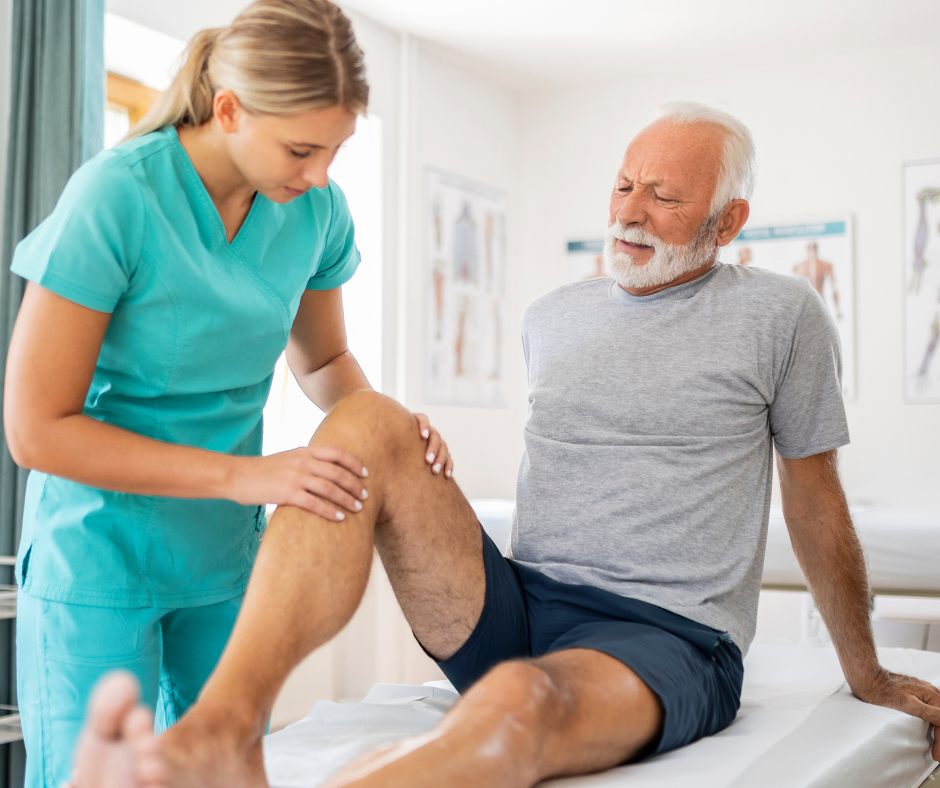24/7 online booking

Osteopathy for Knee Arthritis: A Holistic Approach to Pain Relief
Knee arthritis is a common condition that affects many people, particularly as they age. Characterised by joint pain, stiffness, and reduced mobility, knee arthritis can significantly impact daily life, making it difficult to perform even simple tasks. While there is no cure for arthritis, osteopathy offers a holistic, non-invasive approach to managing the symptoms and improving joint function.
1. Understanding Knee Arthritis
Knee arthritis primarily refers to osteoarthritis, the most common type of arthritis affecting the knee joint. Osteoarthritis is a degenerative condition where the cartilage that cushions the bones in the joint wears down over time. This leads to pain, swelling, and a reduction in the knee's range of motion. Other forms of arthritis, such as rheumatoid arthritis, can also affect the knee, though osteoarthritis is more prevalent.
Common symptoms of knee arthritis include:
- Pain: Typically worsened by activity, knee pain may range from a dull ache to a sharp, debilitating sensation.
- Stiffness: Particularly noticeable after periods of inactivity, stiffness can make it difficult to bend or straighten the knee.
- Swelling: The knee joint may become swollen due to inflammation or fluid build-up.
- Reduced Mobility: As the condition progresses, it can become increasingly difficult to move the knee, affecting walking and other activities.
- Grinding Sensation: A feeling of grating or grinding when moving the knee may occur as the cartilage wears away, leading to bone-on-bone contact.
2. How Osteopathy Can Help with Knee Arthritis
Osteopathy is a form of manual therapy that focuses on the musculoskeletal system, including bones, muscles, and joints. It aims to improve movement, reduce pain, and enhance the body’s ability to heal itself. For those suffering from knee arthritis, osteopathy can offer several benefits:
a. Reducing Pain and Inflammation
Osteopaths use a variety of gentle techniques, such as soft tissue massage, joint mobilisation, and stretching, to help alleviate pain and reduce inflammation in the knee joint. By improving blood flow to the area and reducing muscle tension, osteopathy can help to ease the discomfort associated with arthritis.
b. Improving Joint Mobility
Knee arthritis often leads to reduced mobility, making it difficult to perform everyday activities. Osteopathy can help to restore some of this lost mobility by working on the structures surrounding the knee. Techniques such as joint mobilisation can help to improve the range of motion in the knee, making it easier to move and reducing the strain on other parts of the body.
c. Enhancing Muscle Support
The muscles around the knee play a crucial role in supporting the joint and maintaining its function. Osteopaths work to strengthen and balance these muscles, reducing the load on the knee and helping to stabilise the joint. This can be particularly beneficial in alleviating pain and preventing further degeneration.
d. Addressing Postural Imbalances
Postural imbalances can contribute to knee pain by placing additional stress on the joint. Osteopaths assess your posture and gait to identify any issues that may be exacerbating your symptoms. By correcting these imbalances, osteopathy can help to reduce strain on the knee and improve overall body alignment.
e. Supporting Overall Wellbeing
Osteopathy takes a holistic approach to treatment, considering the body as a whole rather than focusing solely on the knee joint. This means that osteopaths also work on other areas of the body that may be affected by or contributing to knee arthritis. For example, issues in the hips, lower back, or feet can impact knee function, and addressing these areas can provide additional relief.
3. What to Expect During Osteopathic Treatment for Knee Arthritis
If you’re considering osteopathy for knee arthritis, here’s what you can expect during your treatment:
-
Initial Consultation: Your first session will involve a thorough consultation where the osteopath will take a detailed medical history and ask about your symptoms, lifestyle, and how knee arthritis affects your daily life. They will also conduct a physical examination to assess your knee’s mobility, muscle strength, and any postural issues.
-
Personalised Treatment Plan: Based on this assessment, the osteopath will develop a tailored treatment plan to address your specific needs. This plan may include manual therapy techniques, lifestyle advice, and exercises to help manage your symptoms.
-
Treatment Sessions: Osteopathic treatment is hands-on and typically involves gentle techniques aimed at relieving pain, improving mobility, and enhancing joint function. The number of sessions required will vary depending on the severity of your arthritis and how your body responds to treatment.
-
Self-Care and Exercise Advice: In addition to hands-on treatment, your osteopath may provide advice on exercises and lifestyle changes that can help manage knee arthritis. This might include strengthening exercises for the muscles around the knee, stretches to improve flexibility, and tips for maintaining a healthy weight to reduce stress on the joint.
4. Complementary to Other Treatments
Osteopathy can be used alongside other treatments for knee arthritis, such as medication, physiotherapy, or even surgery in severe cases. It offers a complementary approach that can enhance the effectiveness of other treatments and provide additional relief from symptoms.
Conclusion: A Holistic Approach to Knee Arthritis Management
Knee arthritis can be a painful and debilitating condition, but osteopathy offers a holistic, non-invasive approach to managing symptoms and improving joint function. By focusing on the musculoskeletal system and the body as a whole, osteopathy can help to alleviate pain, improve mobility, and support overall wellbeing.
If you’re living with knee arthritis and are considering osteopathy, it’s essential to consult with a qualified and registered osteopath. They can help you understand how osteopathy can be tailored to your individual needs, providing a personalised treatment plan that supports your journey towards better health and mobility. With the right care, you can take steps towards managing your knee arthritis and enjoying a more active, pain-free life.
If you would like to book and appointment with us, you can do so by clicking here.

Leave a comment